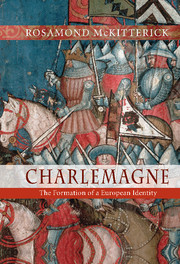Book contents
- Frontmatter
- Dedication
- Contents
- List of maps
- List of tables
- Preface
- List of abbreviations
- 1 Representations of Charlemagne
- 2 Pippinids, Arnulfings and Agilolfings: the creation of a dynasty
- 3 The royal court
- 4 The king and the kingdom: communications and identities
- 5 Correctio, knowledge and power
- Bibliography
- Index of manuscripts
- General index
5 - Correctio, knowledge and power
Published online by Cambridge University Press: 05 August 2015
- Frontmatter
- Dedication
- Contents
- List of maps
- List of tables
- Preface
- List of abbreviations
- 1 Representations of Charlemagne
- 2 Pippinids, Arnulfings and Agilolfings: the creation of a dynasty
- 3 The royal court
- 4 The king and the kingdom: communications and identities
- 5 Correctio, knowledge and power
- Bibliography
- Index of manuscripts
- General index
Summary
INTRODUCTION
When Charlemagne was six years old, he was placed by his father Pippin III at the head of the escort provided for Pope Stephen for the final miles to Ponthion at the end of the pope's long journey across the Alps. Fifty years later, another pope, Leo III, crossed the Alps and spent Christmas in the Frankish kingdom. On that occasion it was Charlemagne's principal heir, Charles the Younger, who escorted the papal entourage from St Maurice d'Agaune to its winter quarters at the royal palace of Quierzy. Only after Christmas did Charlemagne proceed to Aachen to spend the rest of the winter, while the pope was escorted back to Ravenna via Bavaria.
The arrival of Pope Stephen at Ponthion in 754 coincided with the Feast of the Epiphany, but thereafter the pope moved to Paris and St Denis. It was there, in the church of the martyr Denis, and of his supposed companions Rusticus and Eleutherius, that the pope anointed Pippin as king of the Franks. Charlemagne and his brother Carloman, in their turn, were anointed as heirs of the new dynasty, whose ultimate source of authority was God. The version of this event recorded in the Clausula de unctione Pippini offers an inkling of how the pope's actions were understood in subsequent years: the Clausula noted that this consecration was by the intercession of the holy apostles Peter and Paul, that Pippin was made patricius as well as rex, and that the pope ‘bound all, on pain of interdict and excommunication, never to presume in future to elect a king begotten by any men other than those whom the bounty of God has seen fit to raise up and has decided to confirm and consecrate by the intercession of the holy apostles through the hands of their vicar, the most blessed pontiff’.
The papal anointing in 754, its role in the legitimation of the Carolingian dynasty and its contribution to the ideology of Carolingian kingship have long been acknowledged.
- Type
- Chapter
- Information
- CharlemagneThe Formation of a European Identity, pp. 292 - 380Publisher: Cambridge University PressPrint publication year: 2008
- 2
- Cited by

